
Events
Upcoming events.
Our events are open to all, and free.
Missed an event?
Catch up with recordings, slides and other resources in the Members’ Area.
A free login to TFE is required.
Search for a specific topic or presenter
Have an idea for an event?
We are always looking for new ways to support and showcase our membership base!
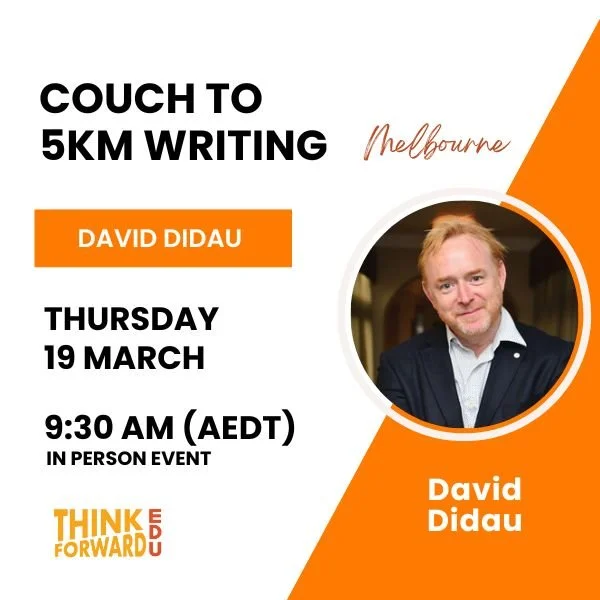
Couch to 5k Writing Workshop
David Didau is an educator, author, and professional learning leader known for his evidence-informed work on teaching, writing, and curriculum. He is the author of several highly regarded books including What If Everything You Knew About Education Was Wrong? and The Secret of Literacy. David writes in his blog The Learning Spy, a widely read platform supporting educators to translate research into classroom practice.
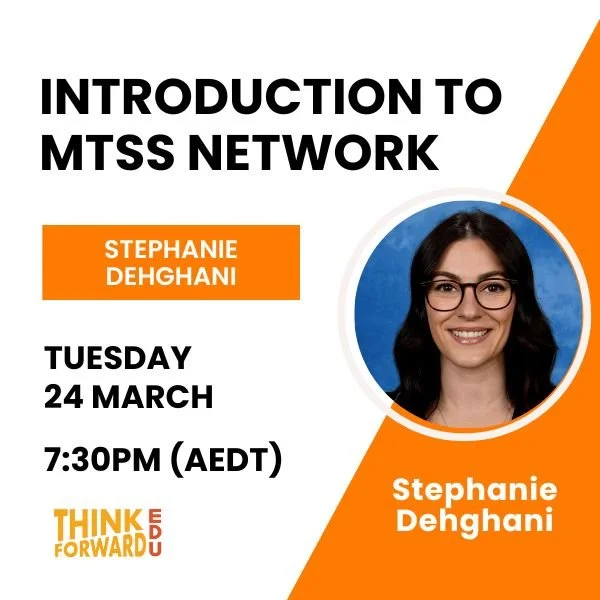
Introduction to MTSS Network
Stephanie Dehghani is an Assistant Principal at Templestowe Heights Primary School in Victoria. With over a decade of experience in evidence-based teaching and school leadership, she currently leads whole-school implementation of Multi-Tiered Systems of Support. Steph's focus is on explicit instruction and effective Tier 2 and 3 intervention.
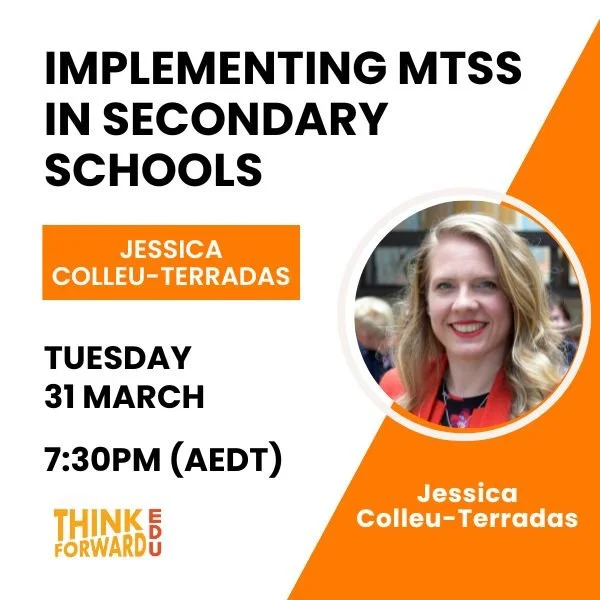
Implementing MTSS in Secondary Schools: Challenges and Strategies
Implementing a Multi-Tiered System of Support (MTSS) in secondary schools presents unique challenges—siloed departments, complex timetables, gaps in foundational skills, subject-specific demands, and adolescent motivation. Drawing on her Churchill Fellowship and experience establishing interventions at Como Secondary College (WA), Jess will share practical strategies and highlight the key non-negotiable pieces of the MTSS puzzle that schools must solve for effective implementation.

Read2Learn - Information Session
Join us for an introduction to the Read2Learn materials. This session will provide a guided walkthrough of selected units, highlighting how the resources can be implemented effectively within your school context.
Project Leaders Melanie Hart and Samantha Charlton, together with experienced teachers from participating schools, will respond to questions and provide practical guidance for educators seeking to embed Read2Learn within the curriculum and strengthen whole-school literacy practices.

Oral Language Skills and Reading Instruction: Teachers’ Carry-On Essential Knowledge
Reading comprehension has been described by Nancy Hennessey* as being like a factory assembly line, taking in a variety of linguistic processes ranging from word decoding through to inferencing and drawing on background knowledge. For this reason, it is essential that teachers understand the language foundations of reading. In this webinar, Hennessey’s metaphor will be used to consider word identification, vocabulary knowledge (including morphology), syntax, figurative/idiomatic language, text-level comprehension, and background knowledge.
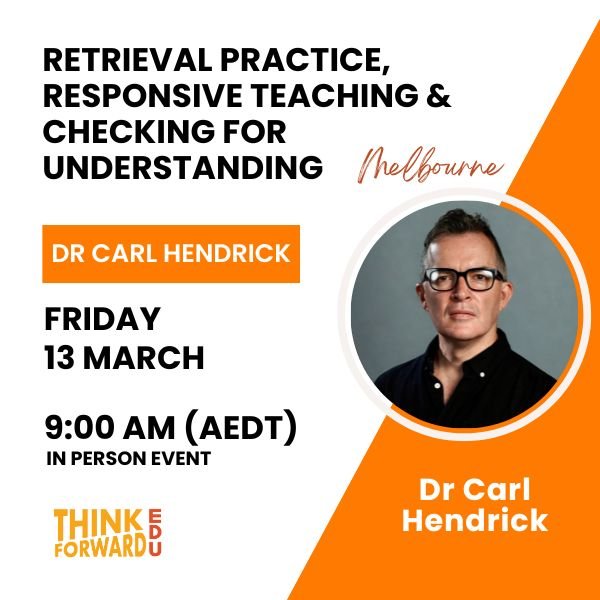
Retrieval Practice, Responsive Teaching & Checking for Understanding
In this session, Dr Carl Hendrick will explore retrieval as a curriculum-wide design feature rather than a starter activity, showing how to build purposeful retrieval streams aligned to curriculum content and avoid low-impact “busy retrieval”.
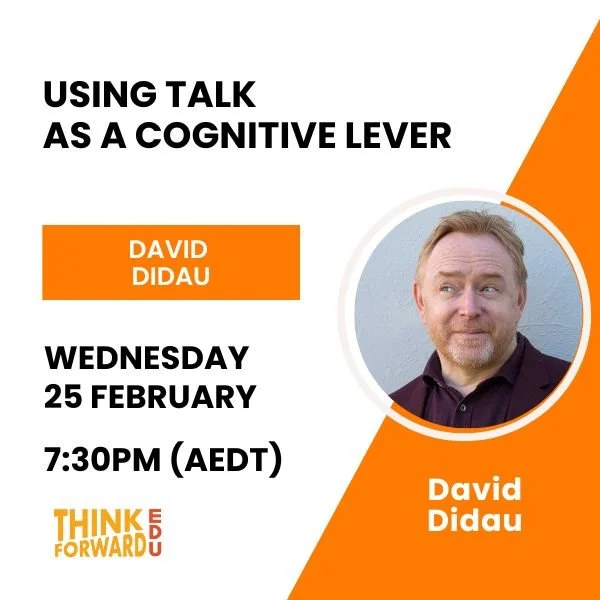
Using Talk As a Cognitive Lever
This session explores how structured talk can be used to improve writing, not as a warm up or engagement strategy, but as a cognitive tool. It begins by clarifying the important differences between speech and writing. Talk is transient and socially supported whereas writing is cognitively demanding and depends on a mastery of syntax. Treating them as interchangeable is one reason so much classroom writing fails.
The session will show how carefully designed talk routines can reduce cognitive load, make thinking visible, and give students much needed practice in using academic English. It will demonstrate how to move from oral rehearsal to controlled writing without slipping into vague discussion or unfocused chat. Teachers will leave with practical routines they can use immediately, alongside a clearer sense of when talk helps writing and when it gets in the way.

1% Better Every Day: Practical Advice for the Evidence-Informed Teacher
Building expertise in anything - sports, music, teaching... - requires solid knowledge, adaptable skills, and dependable habits that help us hit the mark without having to think and try too hard in the moment. So what does the Science of Learning say about this in the context of teaching? And what does the evidence tell us about how to help every teacher become even more impactful than they already are? In this webinar, Stuart will answer these questions, providing insights from state-of-the-art research alongside actionable guidance on strategies and techniques to try out in your own practice.
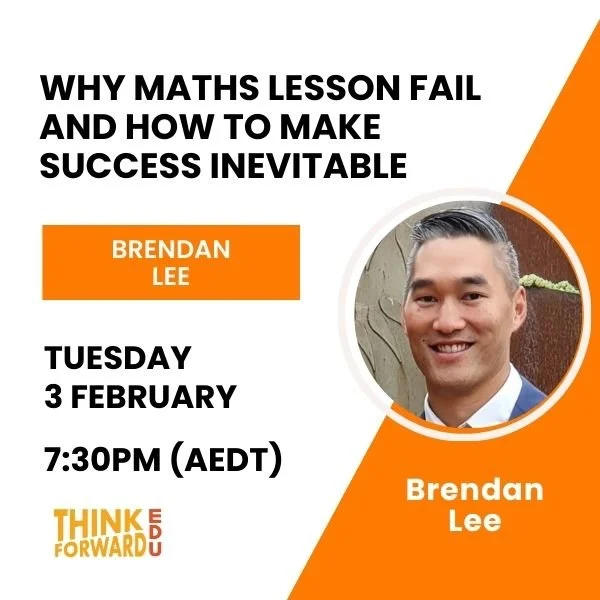
Why Maths Lesson Fail and How to Make Success Inevitable
Teachers are often told to be more responsive, more adaptive, and more flexible. But none of that works without strong instructional design.
In this session, Brendan will explain why many maths lessons fail, but more importantly unpack what teachers can do to make success inevitable. Participants will develop the knowledge needed to make improvements in their classroom right away.

Phonics Plus in the Classroom: Practical Strategies for Success
Join this session to explore how to bring Phonics Plus into your classroom or strengthen your current implementation. You will learn about the key components of Phonics Plus, including phonics, morphology, fluency, and handwriting. Discover practical strategies for implementing lessons and getting started with Phonics Plus.
We will discuss using assessment resources, scaffolds, and extension opportunities for students who are ready for more of a challenge. Supporting resources, including the new slides, will also be covered. Walk away with actionable tips, practical advice, and insights that will help you confidently integrate Phonics Plus into your classroom, fostering stronger reading outcomes, student engagement, and literacy growth for all learners.

Principal as Lead Learner Series - Enabling Learning: Embedding Explicit Instruction Schoolwide
This session shares the journey of Rosewood Downs Primary School as it moved from crisis to sustained improvement. It focuses on the practical, research-informed steps taken to build consistent expectations and strengthen both student behaviours and teacher expertise.

Leading Assessment
in your school. They will unpack whole-school assessment systems and provide practical strategies for leading meetings that change teaching practice using data and feedback for students.

Developing a Knowledge-Rich Subject Curriculum
This session builds on Heather’s previous exploration of the features of a knowledge-rich curriculum.
She will delve deeper into how both subject specialists and non-specialists can contribute to the development and quality assurance of a knowledge-rich curriculum.
Heather will examine why studying discrete subjects matters, and why it is essential for curriculum designers, and those teaching a subject, to possess not only subject knowledge but also an understanding of the subject’s curriculum journey - how knowledge builds over time within a discipline.
A key focus will be on one of the most significant ways subjects differ: the divide between hierarchical subjects - where later knowledge depends heavily on secure earlier foundations - and cumulative subjects - where knowledge accrues and broadens but may not follow a strict conceptual sequence.
Heather will explore key principles of curriculum design: breadth (or scope), coherence, components, disciplinary rigor, and memory - and discuss how these can be thoughtfully applied to different subjects to ensure coherence, depth, and long-term retention.

The Benefits of Fact Fluency when Teaching Mathematics
Join Dr. Poncy as he discusses the benefits of declarative fact fluency when teaching mathematics. The fluent retrieval of basic facts provides distinct advantages over the reliance on multistep counting strategies as students work to access and link prior knowledge with new information to expand math skills.
He will review empirical literature that shows five ways fluent responding with a sequenced set of critical skills supports numeracy development:
1) Increased rates of practice/opportunities to respond
2) Increased rates of reinforcement/decreased effort
3) Diminished demands on cognitive load
4) Skill maintenance &
5) Skill generalization
Singularly, each of these are vitally important to student learning, the aggregation of these provides a compelling argument for the necessity of fluent responding with foundational skills. The webinar will conclude with Dr. Poncy providing data from a 5-year longitudinal study which shows the effect of these practices.
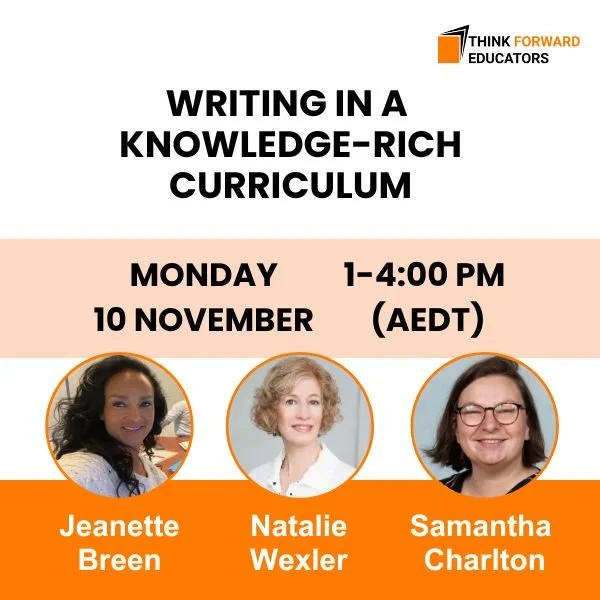
Writing in a Knowledge-Rich Curriculum
Natalie Wexler will be in Australia in November, and Think Forward Educators are privileged to host her in Melbourne for a three-hour event on Monday, 10 Nov. Equity in education is at the heart of TFE’s work, and we encourage you to be part of Natalie’s message on the importance of knowledge, the links to writing, and contextual examples of how classroom practice can be transformed.
Natalie Wexler will be joined by Jeanette Breen and Samantha Charlton of Templestowe Heights Primary School and Think Forward Educators, who will show how The Writing Revolution techniques are applied in context; privileging knowledge-rich curriculum, strong writing frameworks, and transforming classroom practice.

Writing and Knowledge Building
Think Forward Educators in-person: Writing Professional Learning Events in Canberra and Melbourne.
Natalie Wexler, co-author of The Writing Revolution will be in Australia in November, and Think Forward Educators are privileged to host her in Canberra Friday, Nov 7 and Melbourne Monday, 10 Nov.
Equity in education is at the heart of TFE’s work, and we encourage you to be part of Natalie’s message on the importance of knowledge, the links to writing, and contextual examples of how classroom practice can be transformed.
Get tickets for Canberra here and tickets for Melbourne here.

Teaching Maths Explicitly in Small Schools
This online professional learning session will bring together teachers and school leaders from small schools to share how they structure and deliver mathematics in their unique contexts. We will be exploring class structures, typical lesson approaches, key influences on practice, and planning processes such as scope and sequence design or intervention supports.
Teachers will also reflect on challenges faced and outline their next steps, offering practical insights and ideas transferable to other small school settings. This webinar responds to strong demand from regional and rural schools for professional learning that highlights explicit mathematics teaching in small school environments.
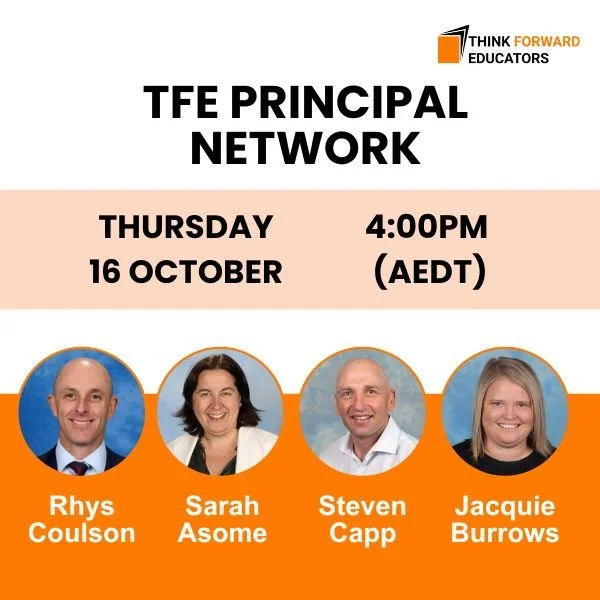
TFE Principal Network
Think Forward Educators invites teachers and leaders to a dynamic webinar exploring the role of the principal as lead learner, framed through the VTLM 2.0 guide for Leading a Whole School Approach.
In this session we will hear from Jacqui Burrows (Churchill PS), Rhys Coulson (Templestowe Heights PS), Sarah Asome (Bentleigh West PS) & Steve Capp (Chelsea Heights PS) to gain practical insights into leading curriculum and instructional change, building capacity, and modelling the professional learning that drives whole-school success.
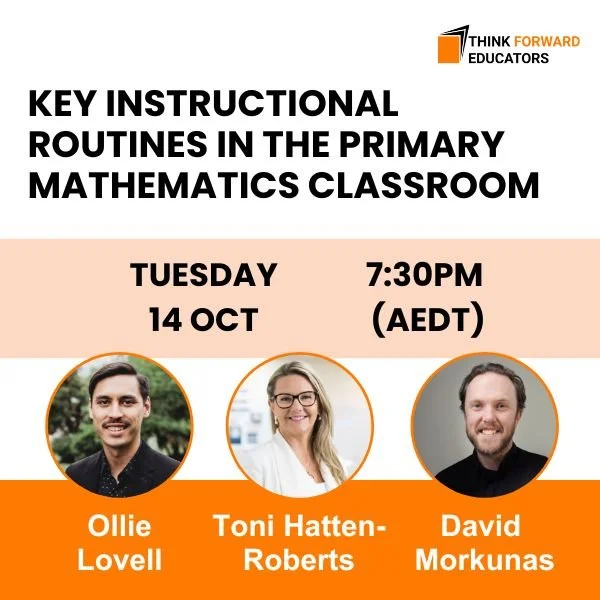
Key Instructional Routines in the Primary Mathematics Classroom
For mathematics instruction to reach its full potential in any school, the school must have a dual focus on both the 'what' and the 'how'. The 'what' is curriculum, the thoughtfully curated, sequenced, and planned content that is to be learnt by students. The 'how' is instruction, the way in which that curriculum is to be enacted in the classroom to maximise students' cognitive engagement and learning. Last year, Ollie, Toni and Dave's TFE presentation on the 'what', Explicit Mathematics Teaching - Unlocking the science of mathematics in the primary classroom, really hit the mark, and was TFE's biggest webinar ever with over 700 registrants.
This year these three renowned educators are back to focus on that second crucial piece of the mathematics puzzle, the 'how'. In this session, Ollie, Toni, and Dave will take you through key instructional practices in your classroom to get the most out of your students regardless of the specific lessons you're teaching. This is a unique opportunity to learn from three key thought leaders in this space and is not to be missed.

Essential Insights for Teaching Maths Effectively
🚨 Tickets now available!
Join us for Essential Insights for Teaching Maths Effectively — a full day of expert-led sessions packed with practical strategies for the classroom.
📅 Saturday 13 September
📍 Dandenong West Primary School
🎟️ $125 per ticket
Hear from 10 inspiring presenters sharing what really works in maths education.
📲 Scan the QR code to get your tickets now!
#MathsEducation #TFEevent #ProfessionalLearning #TeachingMathematics

Epic Fluency Instruction - Maths Ninjas (Session 2)
After Serpentine Primary School shared their fluency program (Maths Ninjas), Kat led the development of this into a targeted 15 minute maths fluency block at her school. She is slowly making all 1700+ resources she developed publicly and freely available. Kat believes all students deserve high quality maths fluency instruction - and all teachers deserve the right to high quality resources to support this.
In Session 2, Kat will model the Ninja Belts (timed testing) system, justify the adaptations made since the original development at Serpentine, and discuss the excitement levels for fluency from the school community. She will address common misconceptions about delivery, model practical setup and how to reduce the administration time. Kat will share the tracking and assessment systems used to monitor individual student progress and whole-school impact.

Teaching Maths Using the Victorian Lesson Plans
This session will provide deeper insight into the Mathematics Lesson Plans developed by the Victorian Department of Education. Sacha will discuss the Victorian Maths position statement and outline the approach to the lessons and resources that have been released to support schools with teaching maths explicitly. The Victorian Lesson Plans are freely available to all educators and this session is open to educators across Australia.

Explicit Teaching and Problem Solving, Using the Instructional Hierarchy
This session explores the essential role of the Instructional Hierarchy in supporting effective learning. Sean unpacks its four stages and outlines how different teaching approaches align with each phase of learning. Using practical examples from primary classrooms, he demonstrates how the framework can inform lesson planning and delivery to support equitable outcomes for all students.
The session also tackles a key question in education: when to teach explicitly and when to use a problem-solving approach—highlighting the value of both within the learning process.

Teach Like a Champion
Learn about the techniques that enable learners to engage in efficient Discussions, respond to rigorous Questioning, and thrive in a culture of continual learning through effective Check for Understanding (CFU).

Epic Fluency Instruction - Strategy Instruction and Practice (Session 1)
After Serpentine Primary School shared their fluency program (Maths Ninjas), Kat led the development of this into a targeted 15 minute maths fluency block at her school. She is slowly making all 1700+ resources she developed publicly and freely available. Kat believes all students deserve high quality maths fluency instruction - and all teachers deserve the right to high quality resources to support this.
In Session 1, Kat will demonstrate how she has incorporated her knowledge of fluency research and inspiration from other maths fluency materials to develop sequenced strategy instruction and practice materials. Informed by the Instructional Hierarchy and following the Gradual Release of Responsibility framework weekly, Kat will model how she systematically builds fact fluency across fact sets. She will reflect on what she has learnt about implementation and how best to support teachers.

Vocabulary: Lyn Stone's 4-Step Process in the Study of Words
Lasting literacy impact requires more than phonics alone. This practical demonstration outlines an integrated approach combining phonics, morphology, orthography, syntax, and etymology. Lyn Stone guides participants through the Four-Step Process used in schools and in her practice to help students study words in depth. The session includes a ready-to-use resource and shows how to connect linguistic and background knowledge to support learners of all ages and abilities.

Minds vs Machines: A Very Short History
What do you know about the history of cognitive science? How familiar are you with the savage battles between "behaviourism" and "mentalism" that took place in the mid-20th century? Would you believe that a book review by Noam Chomsky played a pivotal role? And what does any of this have to do with teaching today? Quite a bit, actually, or so Benjamin Riley will try to persuade you in this provocative session.

The Maths Guarantee: How to implement great primary maths teaching
Grattan Institute is about to publish a guide on how to implement great maths teaching in primary schools. The practical, easy-to-follow guide complements Grattan Institute’s recent report, The Maths Guarantee: How to boost students’ learning in primary schools. In this presentation, Amy Haywood and Nick Parkinson will share Grattan’s summary of the evidence base and distil lessons from seven case study schools that have successfully translated the evidence into practice.
Join them to hear the practical steps your school can take to embed evidence-informed maths teaching in every classroom.

Improving Maths Outcomes with Universal Screening
Screening assessments like DIBELS are increasingly used in English. But what about for maths? This session outlines the experience of Docklands Primary School in using Acadience Math, an example of universal screening assessment. Learn more about the assessment and how it can be used to support school improvement.

Building Strong Writers in Lower Primary: Structured, Explicit Instruction from Sentence to Text Level
This session showcases the highly structured approach used at Serpentine Primary School to support emergent writers in the lower primary years. With a strong focus on oral language, syntax, picture sequences, and macrostructure icons, students are guided from sentence-level writing to rudimentary narratives and information reports. Polly Anderson will share the clear, replicable instructional routines that underpin this approach, including how she differentiates for different writing abilities and gradually removes scaffolds to build independence.

What Do We Mean by a Knowledge-Rich Curriculum?
In this session Heather will go back to first principles and explore why knowledge matters and what is meant by a knowledge-rich curriculum. She’ll discuss what this means for teachers and especially the implications of adopting a knowledge-rich curriculum for lesson design. She’ll consider some of the most common pitfalls when trying to adopt a knowledge-rich approach, for example, moving onto task design without clarity about content choices at different levels of granularity.
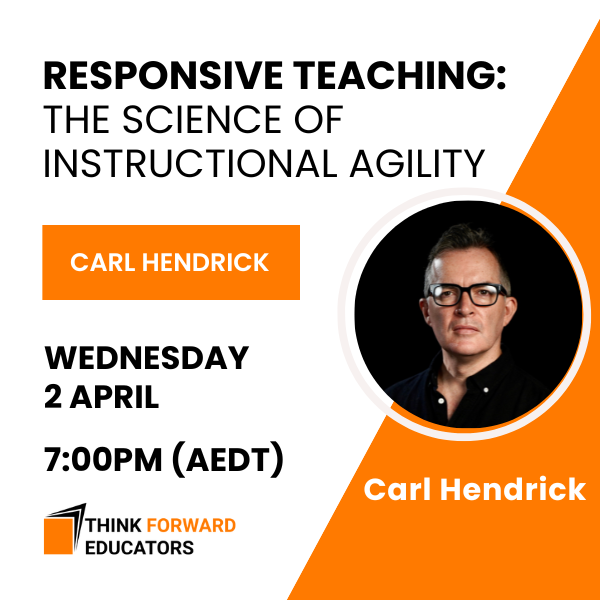
Responsive Teaching: The Science of Instructional Agility
The first session showed that great teaching is not just about delivering content, it’s about adapting instruction based on student understanding and misconceptions. This session will examine how teachers can use real-time feedback to guide their teaching, making learning more effective and targeted. Using insights from cognitive load theory, spaced learning, and scaffolding, we’ll discuss how to respond to student needs, address misconceptions, and adjust instructional strategies on the spot.
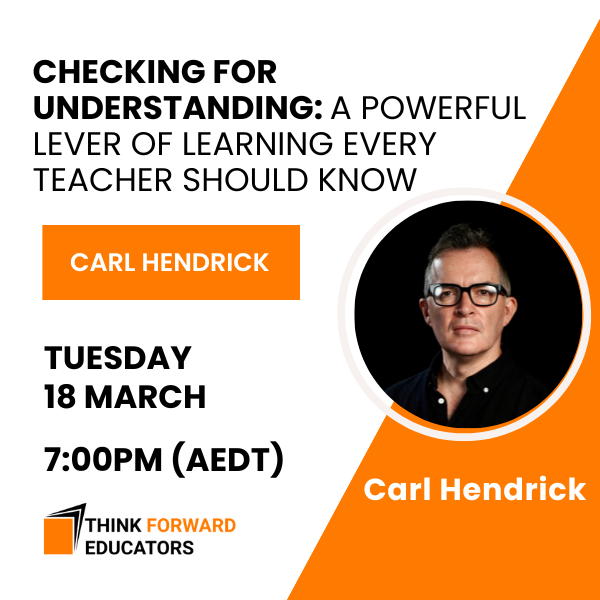
Checking for Understanding: A Powerful Lever of Learning Every Teacher Should Know
How do we know students truly understand rather than just recognizing material? This session tackles one of education's most crucial challenges: accurately assessing student comprehension in real-time. Drawing on research from cognitive science, this session will explore effective strategies for formative assessment, including retrieval practice, diagnostic questioning, and the use of misconceptions as learning opportunities. Participants will leave with practical techniques to make student thinking visible and adjust instruction accordingly.

Reading Reconsidered - Building Background Knowledge
This session will explore Teach Like a Champion's latest guidance on reading pedagogy with a practical look at building knowledge to increase reading comprehension.
Participants will learn about four key tools that allow for strategic and purposeful use of background knowledge:
1) embedded non-fiction texts
2) embellishments
3) knowledge organisers and
4) vocabulary as knowledge.
If you are someone who knows the importance of building background knowledge but are not sure exactly how or where to start, or just want to see it in action, then this session is for you. You'll see some fantastic footage and walk away with some classroom ready actions.
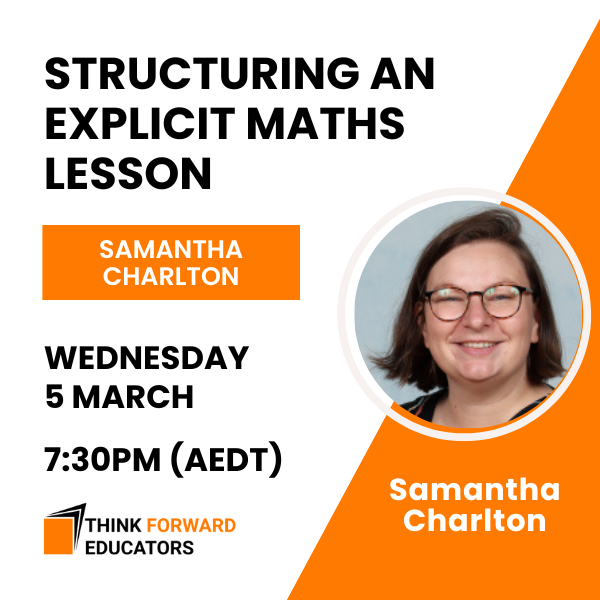
Structuring an Explicit Maths Lesson
This session will unpack what is included in explicit Maths lessons that aligns with the VTLM 2.0. We'll look at evidence-based instructional models that we can draw upon to ensure that our practices align, as well as what this looks like when we are planning and teaching.
Key points included will be:
Review practices
Explicitly teaching new content
Guided and independent practice
Developing fluency
Assessing within lessons

An Introduction to Bar Modelling
Join us for an engaging session on ‘An introduction to bar modelling’. This session is designed to help teachers enhance their classroom strategies by pairing bar models with abstract calculations, improving students' clarity in problem-solving. Learn how bar models can become the essential scaffold between concrete manipulatives and abstract concepts, solidifying core mathematical understanding for all learners.
We will also explore using bar models to explore effective methods that illustrate structural connections between various mathematical concepts, fostering a more cohesive and meaningful learning experience. Gain practical tools that will elevate your teaching practice and ensure all students can engage with and succeed in maths!
More Past Events
All Events
-
May 2026
- May 29, 2026 Retrieval Practice, Responsive Teaching & Checking for Understanding May 29, 2026
- May 26, 2026 Oral Language Skills and Reading Instruction: Teachers’ Carry-On Essential Knowledge May 26, 2026
-
April 2026
- Apr 29, 2026 Read2Learn - Information Session Apr 29, 2026
-
March 2026
- Mar 31, 2026 Implementing MTSS in Secondary Schools: Challenges and Strategies Mar 31, 2026
- Mar 24, 2026 Introduction to MTSS Network Mar 24, 2026
- Mar 19, 2026 Couch to 5k Writing Workshop Mar 19, 2026
-
February 2026
- Feb 25, 2026 Using Talk As a Cognitive Lever Feb 25, 2026
- Feb 24, 2026 1% Better Every Day: Practical Advice for the Evidence-Informed Teacher Feb 24, 2026
- Feb 3, 2026 Why Maths Lesson Fail and How to Make Success Inevitable Feb 3, 2026
-
December 2025
- Dec 10, 2025 Phonics Plus in the Classroom: Practical Strategies for Success Dec 10, 2025
- Dec 3, 2025 Principal as Lead Learner Series - Enabling Learning: Embedding Explicit Instruction Schoolwide Dec 3, 2025
-
November 2025
- Nov 27, 2025 Leading Assessment Nov 27, 2025
- Nov 26, 2025 Developing a Knowledge-Rich Subject Curriculum Nov 26, 2025
- Nov 20, 2025 The Benefits of Fact Fluency when Teaching Mathematics Nov 20, 2025
- Nov 10, 2025 Writing in a Knowledge-Rich Curriculum Nov 10, 2025
- Nov 7, 2025 Writing and Knowledge Building Nov 7, 2025
-
October 2025
- Oct 21, 2025 Teaching Maths Explicitly in Small Schools Oct 21, 2025
- Oct 16, 2025 TFE Principal Network Oct 16, 2025
- Oct 14, 2025 Key Instructional Routines in the Primary Mathematics Classroom Oct 14, 2025
-
September 2025
- Sep 13, 2025 Essential Insights for Teaching Maths Effectively Sep 13, 2025
- Sep 11, 2025 Epic Fluency Instruction - Maths Ninjas (Session 2) Sep 11, 2025
- Sep 1, 2025 Teaching Maths Using the Victorian Lesson Plans Sep 1, 2025
-
August 2025
- Aug 26, 2025 Explicit Teaching and Problem Solving, Using the Instructional Hierarchy Aug 26, 2025
- Aug 21, 2025 Teach Like a Champion Aug 21, 2025
- Aug 19, 2025 Epic Fluency Instruction - Strategy Instruction and Practice (Session 1) Aug 19, 2025
- Aug 12, 2025 Vocabulary: Lyn Stone's 4-Step Process in the Study of Words Aug 12, 2025
-
July 2025
- Jul 23, 2025 Minds vs Machines: A Very Short History Jul 23, 2025
-
June 2025
- Jun 17, 2025 The Maths Guarantee: How to implement great primary maths teaching Jun 17, 2025
- Jun 3, 2025 Improving Maths Outcomes with Universal Screening Jun 3, 2025
-
May 2025
- May 29, 2025 Building Strong Writers in Lower Primary: Structured, Explicit Instruction from Sentence to Text Level May 29, 2025
- May 27, 2025 What Do We Mean by a Knowledge-Rich Curriculum? May 27, 2025
-
April 2025
- Apr 2, 2025 Responsive Teaching: The Science of Instructional Agility Apr 2, 2025
-
March 2025
- Mar 18, 2025 Checking for Understanding: A Powerful Lever of Learning Every Teacher Should Know Mar 18, 2025
- Mar 12, 2025 Reading Reconsidered - Building Background Knowledge Mar 12, 2025
- Mar 5, 2025 Structuring an Explicit Maths Lesson Mar 5, 2025
-
February 2025
- Feb 4, 2025 An Introduction to Bar Modelling Feb 4, 2025
-
December 2024
- Dec 12, 2024 Harnessing the Science of Learning Dec 12, 2024
- Dec 11, 2024 Implementing the VC2.0 Mathematics Curriculum Dec 11, 2024
-
November 2024
- Nov 26, 2024 Putting the Science of Learning into Primary Science Nov 26, 2024
- Nov 20, 2024 Simplifying Phonics with Fidelity Nov 20, 2024
- Nov 6, 2024 Leading a Whole School Approach to Classroom Management Nov 6, 2024
-
October 2024
- Oct 30, 2024 What is the Science of Maths? Implications for Instruction Oct 30, 2024
- Oct 28, 2024 Improving Writing Oct 28, 2024
- Oct 23, 2024 Designing the ‘Desirably Difficult’ Classroom Oct 23, 2024
- Oct 17, 2024 What High Performing Countries are Doing in Maths Oct 17, 2024
-
September 2024
- Sep 17, 2024 Genre Theory/Systemic Functional Linguistics-based Pedagogies in K-10 Education: Very influential, but do they improve reading and writing outcomes? Sep 17, 2024
- Sep 10, 2024 The Best Word List is a Book! Sep 10, 2024
- Sep 5, 2024 How Writing Instruction Can Revolutionize Education Sep 5, 2024
-
August 2024
- Aug 21, 2024 Teaching Fractions Using an Explicit CRA Approach Aug 21, 2024
- Aug 14, 2024 An Introduction to Spelling Mastery with Jessica Colleu Terradas Aug 14, 2024
- Aug 7, 2024 The new Victorian approach to reading in F-2: What schools can expect next Aug 7, 2024
-
July 2024
- Jul 31, 2024 Explicit Mathematics Teaching - Unlocking the science of mathematics in the primary classroom Jul 31, 2024
- Jul 30, 2024 The Myth of Discovery-Based Learning in Maths Jul 30, 2024
- Jul 25, 2024 How do you listen to your students read? Jul 25, 2024
-
June 2024
- Jun 24, 2024 Teacher perspectives on the new phonics & explicit teaching policies in Victoria Jun 24, 2024
- Jun 18, 2024 Implementing an Effective Multi-tiered System of Support to Teach Spelling Jun 18, 2024
-
May 2024
- May 29, 2024 Office Hours with Dr Nathaniel Swain May 29, 2024
- May 21, 2024 Instructional Coaching - professional development that reignites the skill and dignity of the teaching profession May 21, 2024
- May 15, 2024 The Inclusive Maths Classroom May 15, 2024
- May 8, 2024 Checking for listening with Craig Barton May 8, 2024
- May 1, 2024 Improving behaviour and engagement in your classroom May 1, 2024
-
April 2024
- Apr 30, 2024 Direct Instruction: Introduction and History Apr 30, 2024
- Apr 22, 2024 Teach Like a Champion: Overview and Connection to Australian Evidence Apr 22, 2024
- Apr 17, 2024 Office Hours with Reid Smith Apr 17, 2024
-
March 2024
- Mar 26, 2024 Principals’ Forum: St Mary’s Primary School in Myrtleford Mar 26, 2024
- Mar 14, 2024 The Concrete-Pictorial-Abstract Framework with Brad Nguyen Mar 14, 2024
- Mar 13, 2024 Office Hours with Dr Russ Fox Mar 13, 2024
-
February 2024
- Feb 26, 2024 Sharing the load: How five schools do whole-school curriculum planning Feb 26, 2024
- Feb 21, 2024 Engaged Classrooms Through Effective Classroom Management Feb 21, 2024
- Feb 15, 2024 Catalyst, an evidence-based approach to learning and teaching for classroom, school and system improvement. Feb 15, 2024
-
November 2023
- Nov 28, 2023 Instructional Coaching with Ollie Lovell and Josh Goodrich Nov 28, 2023
- Nov 21, 2023 Maths Learning Difficulties and Dyscalculia with Nathalie Parry Nov 21, 2023
- Nov 20, 2023 Principals' Forum: Leading Change through Complexity Nov 20, 2023
- Nov 16, 2023 Teaching that aligns with how students learn AERO’s teaching & learning model Nov 16, 2023
- Nov 15, 2023 Read2Learn Information Session Nov 15, 2023
- Nov 9, 2023 Mathematics in the Early Years Nov 9, 2023
- Nov 8, 2023 Secondary Writing: Insights into AERO’s school-wide approach to teaching writing Nov 8, 2023
- Nov 8, 2023 Bendigo Term 4 Meeting (in person) Nov 8, 2023
- Nov 2, 2023 Navigating Transformation: Our Path to Success at Devon Meadows Primary School Nov 2, 2023
-
October 2023
- Oct 26, 2023 Middle Leaders' Forum: Change management and cognitive bias Oct 26, 2023
- Oct 19, 2023 What you need to know about teaching primary mathematics Oct 19, 2023
- Oct 17, 2023 Spelling Out Words: What works best? Oct 17, 2023
- Oct 10, 2023 Assessment and Reporting without Benchmarking: What does it look like? Oct 10, 2023
-
September 2023
- Sep 7, 2023 Middle Leaders’ Forum: Using Data for Impact - Post event discussion Sep 7, 2023
- Sep 2, 2023 The What Works Series: Primary Maths Conference Sep 2, 2023
-
August 2023
- Aug 31, 2023 Middle Leaders’ Forum: Using Data for Impact with Dr Selena Fisk Aug 31, 2023
- Aug 31, 2023 ACT Branch: Movie Night Aug 31, 2023
- Aug 29, 2023 Principals’ Forum: Sarah Kelly - Principal on a journey Aug 29, 2023
- Aug 22, 2023 Live Coaching Workshop Aug 22, 2023
- Aug 16, 2023 ChatGPT for Literacy Teachers Aug 16, 2023
- Aug 7, 2023 What’s important for maths intervention? Aug 7, 2023
- Aug 2, 2023 Bendigo Branch In-Person Meeting Aug 2, 2023
-
July 2023
- Jul 25, 2023 Launch Event for TFE Secondary Network Jul 25, 2023
- Jul 12, 2023 Guided Practice in Maths Jul 12, 2023
-
June 2023
- Jun 8, 2023 The Writing Network hosting The Writing Revolution’s Toni-Ann Vroom & Dina Zoleo Jun 8, 2023
-
May 2023
- May 31, 2023 Lyn Stone - Spelling Choice Hell - Gippsland Branch May 31, 2023
- May 24, 2023 Dr Russ Fox - Practical ways to collect and use student behavioural data May 24, 2023
- May 24, 2023 Bendigo Branch In-Person Meeting May 2023 May 24, 2023
- May 17, 2023 How do we make the most of examples, explanations, and elaborations? May 17, 2023
- May 11, 2023 Read 2 Learn Australian Units - Call for Writers May 11, 2023
- May 4, 2023 Marshall Roberts - Putting the tract in tractor: Dragging literacy out of the dark ages - Tas Branch May 4, 2023
- May 3, 2023 Principals’ Forum - Marsden Road Public School - Manisha Gazula May 3, 2023
-
April 2023
- Apr 27, 2023 Dr Daniel Ansari - Building blocks of mathematical competence: evidence from brain and behaviour Apr 27, 2023
-
March 2023
- Mar 30, 2023 Embedding Explicit Direct Instruction: Rosenshine’s Principles Mar 30, 2023
- Mar 23, 2023 ACT Branch - Online Meeting Mar 23, 2023
- Mar 14, 2023 SA Branch - Tier 2 Intervention for Secondary Students Mar 14, 2023
- Mar 3, 2023 Writing Masterclass - Daisy Christodoulou & Dr Nathaniel Swain Mar 3, 2023
-
February 2023
- Feb 7, 2023 How Cognitive Load Theory changed my teaching - Inaugural Middle Leaders’ Forum (Copy) Feb 7, 2023
-
December 2022
- Dec 6, 2022 Bendigo Branch In-Person Meeting Dec 6, 2022
- Dec 1, 2022 Toni Hatten-Roberts - Science of Maths and the Importance of Fluency Dec 1, 2022
-
November 2022
- Nov 30, 2022 Live Workshop - Implementing the science of learning when the rest of the school isn't Nov 30, 2022
- Nov 16, 2022 GELL Nov Meeting - Monitoring Early Reading Progress Nov 16, 2022
- Nov 2, 2022 James Dobson - Laying Mathematical Foundations - Maths Network Nov 2, 2022
-
October 2022
- Oct 25, 2022 Science of Maths with Dr Amanda VanDerHeyden Oct 25, 2022
- Oct 24, 2022 Read 2 Learn Australian Units - Project Update Oct 24, 2022
- Oct 11, 2022 Dive into DIBELS Reading Assessment Oct 11, 2022
-
September 2022
- Sep 14, 2022 David Morkunas Launching the Think Forward Maths Network Sep 14, 2022
-
August 2022
- Aug 30, 2022 The Writing Network Connect discussion Term 3 2022 Aug 30, 2022
- Aug 29, 2022 From the big five to a coherent curriculum: Dr Nathaniel Swain and Shane Pearson Aug 29, 2022
- Aug 25, 2022 What it takes to shift practice - Montello Primary School's Journey towards structured literacy Aug 25, 2022
- Aug 23, 2022 Principals’ Forum - Riverwood Public School - Anne Davis Aug 23, 2022
- Aug 16, 2022 Shane Pearson - Introducing PhOrMeS: A Free Foundation-Year 6 Word Reading & Spelling Curriculum Aug 16, 2022
-
July 2022
- Jul 21, 2022 SA Branch - In Person Meet Up Jul 21, 2022
- Jul 20, 2022 Follow Up Q and A - Creating and sustaining effective learning environments using behaviour science Jul 20, 2022
-
June 2022
- Jun 21, 2022 Beyond Phonics...Morphology & Why it Matters Jun 21, 2022
- Jun 14, 2022 Implementing the science of learning when the rest of the school isn't - Brendan Lee Jun 14, 2022
- Jun 8, 2022 Principals’ Forum - Beeliar Primary School - Louise O’Donovan and Sarah Gasmier Jun 8, 2022
- Jun 2, 2022 NSW Branch - Jun 2022 Meeting with Pam Snow Jun 2, 2022
-
May 2022
- May 26, 2022 The Writing Network Connect discussion Term 2 2022 May 26, 2022
- May 19, 2022 ACT Branch - Patrick Ellis - Canberra & Goulburn Archdiocese May 19, 2022
- May 17, 2022 A crash course in pedagogy for surviving and thriving in the English classroom May 17, 2022
- May 11, 2022 Dr Toni Seiler - GELL May 2022 Meeting - May 11, 2022
- May 5, 2022 Geelong Branch - Inaugural Meeting May 5, 2022
-
April 2022
- Apr 4, 2022 Principals’ Forum - Churchill Primary, Jacquie Burrows Apr 4, 2022
-
March 2022
- Mar 31, 2022 Answering your questions about mathematics education Mar 31, 2022
- Mar 29, 2022 Read 2 Learn Project Launch Mar 29, 2022
- Mar 24, 2022 SA Branch Trauma informed schooling and EDI Mar 24, 2022
- Mar 16, 2022 Effective classroom setup: Docklands Primary Mar 16, 2022
- Mar 2, 2022 The Writing Network hosting The Writing Revolution’s Toni-Ann Vroom & Dina Zoleo Mar 2, 2022
-
February 2022
- Feb 28, 2022 Mentor Program Professional Learning - Teaching Sprints Feb 28, 2022
- Feb 16, 2022 Creating and sustaining effective learning environments using behaviour science - Dr Russ Fox and Dr Erin Leif Feb 16, 2022
- Feb 10, 2022 Mentor Program 2022 Info Session Feb 10, 2022
-
December 2021
- Dec 7, 2021 Dr Jenny Donovan - Off the website and into the classroom: How AERO is going to accelerate the use of evidence in education practice Dec 7, 2021
- Dec 2, 2021 The Writing Network Connect discussion Term 4 2021 Dec 2, 2021
-
November 2021
- Nov 30, 2021 Benji Gersh - Greater Space Nov 30, 2021
- Nov 24, 2021 Principals’ Forum with Steven Capp Nov 24, 2021
- Nov 24, 2021 Developmental Language Disorder - What every teacher needs to know Nov 24, 2021
- Nov 11, 2021 Kathryn Thorburn - NSW Branch - Oral Language in the Classroom across K-12: Supporting Learning to Read & Reading to Learn Nov 11, 2021
- Nov 10, 2021 GELL Nov Meeting - Setting Up 2022 for Success Nov 10, 2021
- Nov 3, 2021 Brad Nguyen - Getting Started with a Knowledge-Rich Curriculum Nov 3, 2021
-
October 2021
- Oct 21, 2021 Jocelyn Seamer - Challenge Accepted: Practical Actions for Reading Success - TAS Branch Oct 21, 2021
- Oct 19, 2021 Dr Rob Coe - The Great Teaching Toolkit: An evidence based approach to improving school-wide education outcomes Oct 19, 2021
- Oct 18, 2021 North East Murray Branch October Meeting Oct 18, 2021
- Oct 13, 2021 Stuart Kitto - Quality Differentiated Teaching Starts at Wave 1 - SA Branch Oct 13, 2021
-
September 2021
- Sep 27, 2021 SA Branch - The Writing Revolution Book Club Ch 9 Sep 27, 2021
- Sep 16, 2021 Mentor Program Mentor & Mentee Touch Base Session Sep 16, 2021
- Sep 13, 2021 North East Murray Branch Inaugural Meeting Sep 13, 2021
- Sep 8, 2021 Lyn Stone - Spelling in a Complex Orthography - Gippsland Branch Sep 8, 2021
- Sep 8, 2021 POSTPONED - ACT Branch - In Person Meeting Sep 8, 2021
- Sep 7, 2021 Jenny Baker - Designing a Low Variance Spelling & Reading Curriculum Sep 7, 2021
- Sep 2, 2021 The Writing Network Connect discussion #2 Sep 2, 2021
-
August 2021
- Aug 30, 2021 Jack Neil - Moving towards the Science of Learning Aug 30, 2021
- Aug 30, 2021 SA Branch - The Writing Revolution Book Club Ch 8 Aug 30, 2021
- Aug 25, 2021 Professor Kate Nation: The nature and content of children's book language: implications for language and literacy development Aug 25, 2021
- Aug 19, 2021 Principals’ Forum Term 3 2021 Aug 19, 2021
- Aug 11, 2021 Eastern Melbourne Branch Aug 11, 2021
- Aug 3, 2021 Prof Anne Castles - Using cognitive models as a roadmap for assessment and teaching reading Aug 3, 2021
-
July 2021
- Jul 29, 2021 How revolutionary is The Writing Revolution? - Dr Damon Thomas - TAS Branch - Inaugural Event Jul 29, 2021
- Jul 29, 2021 ACT Writing Revolution Community of Practice Jul 29, 2021
- Jul 28, 2021 Central Melbourne Branch - Inaugural Meeting Jul 28, 2021
- Jul 26, 2021 SA Branch - The Writing Revolution Book Club Ch 7 Jul 26, 2021
- Jul 25, 2021 An Evening with Jordan Baker Jul 25, 2021
- Jul 22, 2021 POSTPONED Geelong Branch - Inaugural Meeting Jul 22, 2021
- Jul 20, 2021 The Writing Network Connect discussion Jul 20, 2021
- Jul 19, 2021 Mentor Program Info Session Jul 19, 2021
-
June 2021
- Jun 28, 2021 SA Branch - The Writing Revolution Book Club Ch 5 and 6 Jun 28, 2021
- Jun 24, 2021 QLD Branch - Inaugural Meeting Jun 24, 2021
- Jun 24, 2021 NT Branch - The Writing Revolution Book Club Meeting 2 Jun 24, 2021
- Jun 22, 2021 TFE June Webinar - Snow, Serry, and McLean - Dual-qualified teachers and speech pathologists Jun 22, 2021
- Jun 17, 2021 Carina McSweeney - The Science of Reading in NSW schools - NSW Branch Jun 17, 2021
- Jun 16, 2021 SA Branch - Bill Hansberry - Multisensory Structured Literacy Jun 16, 2021
- Jun 12, 2021 WA Branch - Inaugural Event - In-Person Jun 12, 2021
- Jun 10, 2021 Principals’ Forum - Ellen Stirling Primary & Yates Avenue Public School Jun 10, 2021
- Jun 9, 2021 Gippsland Branch - Speech Sounds and Sound Walls Jun 9, 2021
-
May 2021
- May 20, 2021 NT Branch - The Writing Revolution Book Club Ch 1 and 2 May 20, 2021
- May 18, 2021 Troy Verey - Are the five components of reading enough? How explicit instruction can increase reading success. May 18, 2021
- May 12, 2021 Systematic Synthetic Phonics: How & Why? - Rosemary Roberts - Gippsland Branch - GELL May 12, 2021
- May 3, 2021 SA Branch - The Writing Revolution Book Club Ch 2 May 3, 2021
-
April 2021
- Apr 29, 2021 The Science of School Improvement — David MacSporran and Yates Avenue Public School Apr 29, 2021
- Apr 27, 2021 Reid Smith - Building a Coherent Curriculum Apr 27, 2021
- Apr 20, 2021 Greg Clement — Clayton South Primary School Apr 20, 2021
- Apr 14, 2021 SA Branch - In Person Meet Up Apr 14, 2021
-
March 2021
- Mar 18, 2021 NSW Branch - Inaugural Meeting Mar 18, 2021
- Mar 17, 2021 Gippsland Branch - Dr Toni Seiler - What do we mean by the Science of Reading? Mar 17, 2021
- Mar 10, 2021 Principals’ Forum - Brandon Park & Templestowe Heights Mar 10, 2021
- Mar 2, 2021 An evening with Daisy Christodoulou Mar 2, 2021
- Mar 1, 2021 SA Branch - The Writing Revolution Book Club Ch 1 Mar 1, 2021
-
December 2020
- Dec 1, 2020 Syntax for the primary years - Stephanie Le Lievre Dec 1, 2020
-
November 2020
- Nov 24, 2020 Science of Reading in Practice - Jacquie Burrows, Churchill Primary Nov 24, 2020
- Nov 17, 2020 Literacy intervention for secondary students - Melanie Henry Nov 17, 2020
- Nov 9, 2020 Principals’ Forum with Steve Capp & Jacquie Burrows Nov 9, 2020
-
October 2020
- Oct 13, 2020 Celebrate DLD Awareness Day with Dr Julia Starling Oct 13, 2020
-
September 2020
- Sep 29, 2020 At the intersection of instruction and race: Leveraging effective instruction to advance educational equity Sep 29, 2020
- Sep 15, 2020 Literacy for secondary students on the margins: Pamela Snow and Nathaniel Swain Sep 15, 2020




















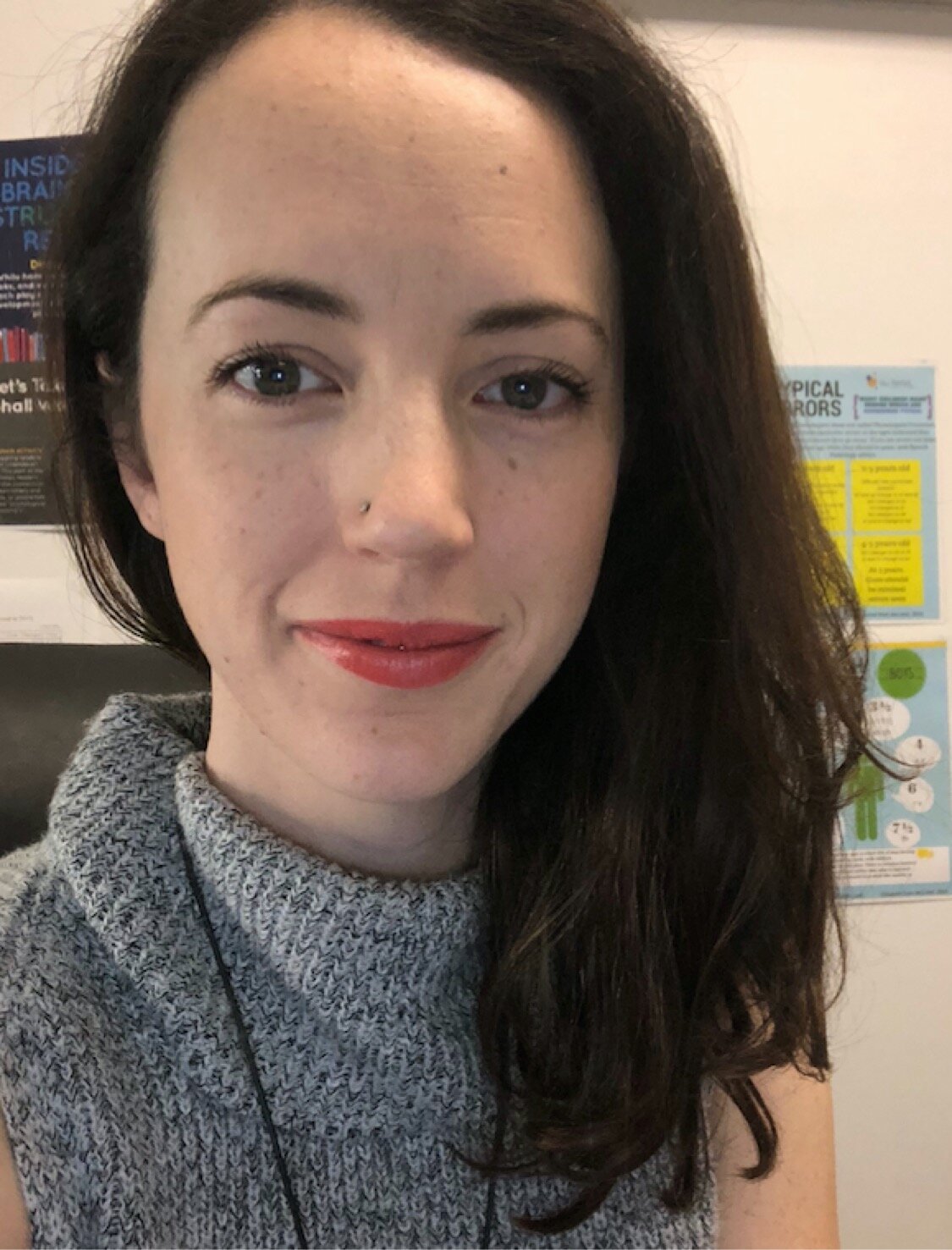





Join our conversation with acclaimed journalist Jordan Baker to talk all things education - from the recent Maths Curriculum controversies, to the Reading Wars redux.